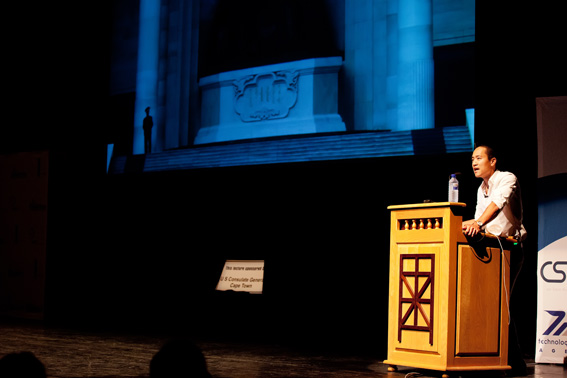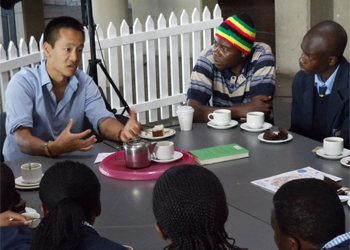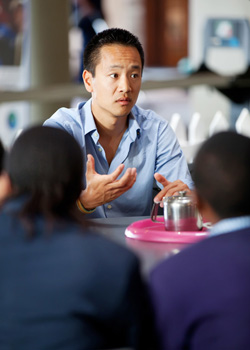Invited by U.S. State Department, UC San Diego Researcher Engages Students, Public in South Africa
San Diego, April 16, 2012 -- As fellow researchers from the University of California, San Diego were participating in the San Diego Science Festival last month, alumnus and research scientist Albert Yu-Min Lin was exciting students and the public at a science festival more than 10,000 miles away – in South Africa.
|
Lin is a research scientist in the UCSD division of the California Institute for Telecommunications and Information Technology (Calit2), and he was invited by the U.S. Consulate General in Cape Town to represent the United States in Scifest’s high-profile speaker series.
“I felt incredibly proud to be part of this international campaign to promote science, education and diplomacy,” says Lin. “It is wonderful to see scientific research being viewed as a bridging point between cultures and nations. From my many conversations and experiences at Scifest Africa, it was clear that curiosity and the pursuit of knowledge can connect us at a human level.”
|
“Albert Lin brought his infectious passion for science and exploration to all his interactions with the public and students at SciFest Africa. Youth and adults alike were inspired and energized after hearing how he has applied his training in math, science and engineering to solve this 800-year-old mystery,” said Cynthia Brown, Public Diplomacy Officer at the U.S. Consulate General in Cape Town. “Albert is a wonderful cultural ambassador who embodies the idea that science is fun and full of new discoveries, and this is precisely the outcome we seek when we engage in educational outreach of this type.”
In his main lecture, Lin talked about how his team used satellite images, aerial remote sensing, advanced ground-penetrating radar and other non-invasive, non-destructive archaeological imaging technologies to scour remote landscapes of Mongolia. The project also had a major public component: anyone with an Internet connection could download ultra-high-resolution satellite images and ‘tag’ them if there were anomalies or other signs of tombs or other cultural heritage sites visible from the satellite. This ‘crowdsourcing’ platform was developed at Calit2 UC San Diego under Lin’s leadership, and it has enabled more than 16,000 ‘online explorers’ to participate via the Field Experience: Mongolia portal set up on the National Geographic website. To date, visitors have analyzed satellite images and left 2.1 million tags to indicate areas of potential interest.
|
“These conversations ended up being a lot about how they can take action around the things they care about, and some different strategies to let the world know about what they are doing,” says Lin. “Spending time with small groups of students and researchers from around South Africa allowed us to share our mutual experiences with science.”
Scifest Africa was established in 1997 to promote public engagement with science, technology, engineering, mathematics and innovation (STEMI), and to encourage youth to follow careers and become leaders in these fields. This year the program featured more than 520 events, including lectures, science shows, workshops, exhibitions, a robotics competition, laser show, soap box race and other opportunities to encourage young people to embark on careers in STEMI fields.
“Albert Lin is a great role model and teacher, and his message resonated with elementary, high-school and university students as well as the public at large,” says Scifest Africa director Anja Fourie. “He is such a dynamic speaker but he also engages easily with smaller groups, and as a scientist and engineer who also chased his dream of applying technologies to exploration, including the search for Genghis Khan’s tomb, Albert made all of us feel as if he was taking us along with him on a voyage of discovery.”
Lin is a researcher in Calit2’s Center of Interdisciplinary Science for Art, Architecture and Archaeology (CISA3), and runs the joint UCSD-National Geographic Engineers for Exploration student program. In 2010 Lin was named an Emerging Explorer by the National Geographic Society, and the following year he was awarded the Lowell Thomas Medal by the Explorers Club.
While he was impressed with Scifest Africa and the U.S. government’s willingness to sponsor his participation, Lin left Africa even more convinced that science and technology can play a bigger role in U.S. public diplomacy efforts abroad.
|
“With all the challenges we face, the cultivation of scientific interest in our future generations should be a global priority,” adds Lin, a three-time UCSD Jacobs School of Engineering alumnus (Ph.D. ‘08 in materials science, M.S. ’06 and B.S. ’04, both in electrical engineering). “I look forward to more opportunities to be part of the global science outreach movement – and to participate in public diplomacy programs that highlight the power of international collaboration.”
Media Contacts
Doug Ramsey, 858-822-5825, dramsey@ucsd.edu
Related Links
Scifest Africa
Scifest Africa Image Gallery
Field Expedition: Mongolia
Technology for Cultural Heritage





